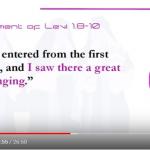Some might point to things I do and pictures I share from them as “the definition of nerdiness.” Gen Con presumably springs immediately to mind at the moment. But that isn’t literally a definition, and a definition I read in a book review on the blog of the publisher Hendrikson (for a book by Andy Walsh, Faith Across the Multiverse, that sounds really interesting) offered an actual definition that I like and so want to share. Let me give it in its context:
Another surprising discovery I made as I read Faith across the Multiverse was the presence of so many nostalgic pop-culture references. For those of us who grew up watching Star Trek or Alien, reading Marvel or X-Men comics, or playing Dungeons & Dragons or video games, this book will be a treasure trove of hilarious and pertinent references that highlight his points. One of the key sentences in the book is the following:
Do you ever wonder what science fiction and fantasy stories, board and video games, and science and technology have in common that makes them nerdy? The usual circular definition—those are the things nerds like—isn’t very informative. What they share is potential for exploring the world, not just as it is, but how it might be, could be, perhaps should be. … Thus to be a nerd is to be in touch with reality, yet not beholden to it.
This idea is central to the whole book: in order to fully experience God, we must learn about the world he created and stoke our curiosity about the ever-changing nature of morality, ethics, and God’s presence in this chaotic universe.
“To be a nerd is to be in touch with reality, yet not beholden to it.” I could see myself wearing that definition of nerdiness on a t-shirt. Yes, I do recognize that that in itself would be an incredibly nerdy thing to do…
See also this interview for more about the book that led to the quote that led to this post:
https://hendricksonpublishers.wordpress.com/2018/07/18/q-and-a-faithacrossthemultiverse/
There is also a lengthy review on the blog Cogent Christianity:
https://hendricksonpublishers.wordpress.com/2018/07/30/book-review-faith-across-the-multiverse-by-andy-walsh/
In it, Abraham George Mathew writes:
Before picking up this book, I would have told you that it is impossible for someone to explain concepts like sin, grace, free will, sovereignty, love, creativity, etc. using a crazy mixture of things like geometric axioms, statistical graphs, photons, viruses, ants, graphic design, the X-Men and other Marvel comics, Ant-Man, Ender’s Game, Doctor Strange, The Matrix trilogy, Raiders of the Lost Ark, and Star Wars. And yet, after finishing this book, I have to admit that Andy Walsh has indeed achieved what I thought was impossible. And to understand how well he has achieved this, you need to get the book.
Continuing on about the good stuff about the book, I cannot stress on how well Walsh has managed to simplify probably some of the most difficult concepts to grasp in science (including stuff in quantum mechanics or complex mathematical ideas), and a large part of this was due to the analogical reasoning that he employed by using pop-culture references. Once he made sure the reader had understood the scientific concepts, he then utilized those concepts to explain perhaps even more complex theological concepts. Through this three-step explanatory process (pop culture to science to theology), the brilliance of the analogical method really shines through in breaking down the most toughest concepts and that is something that must be appreciated. I must also admit that reading this book has got me making analogies of my own between things I see in my everyday life and theological concepts that I read about in the Bible.














